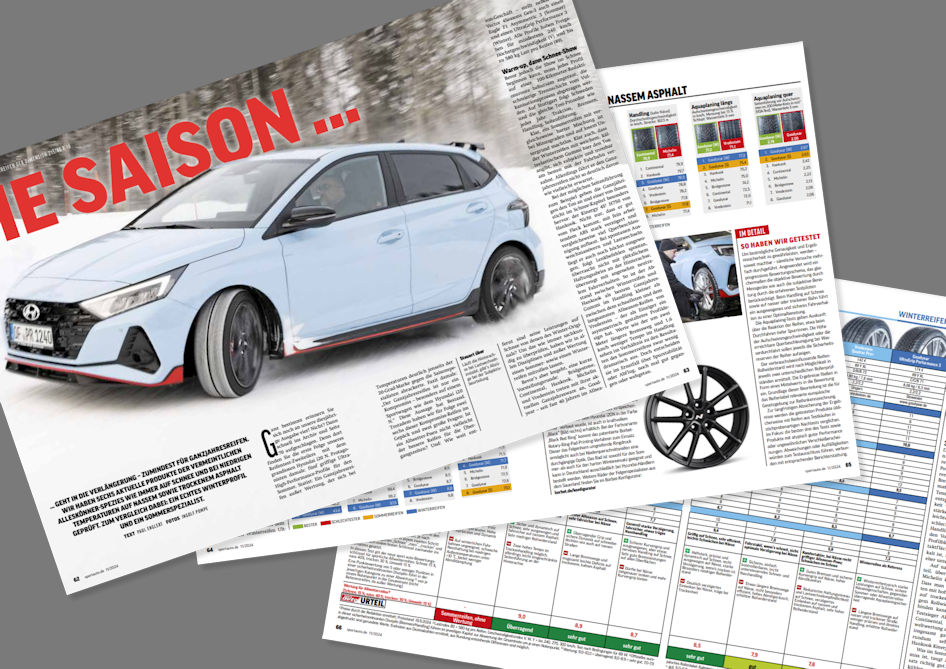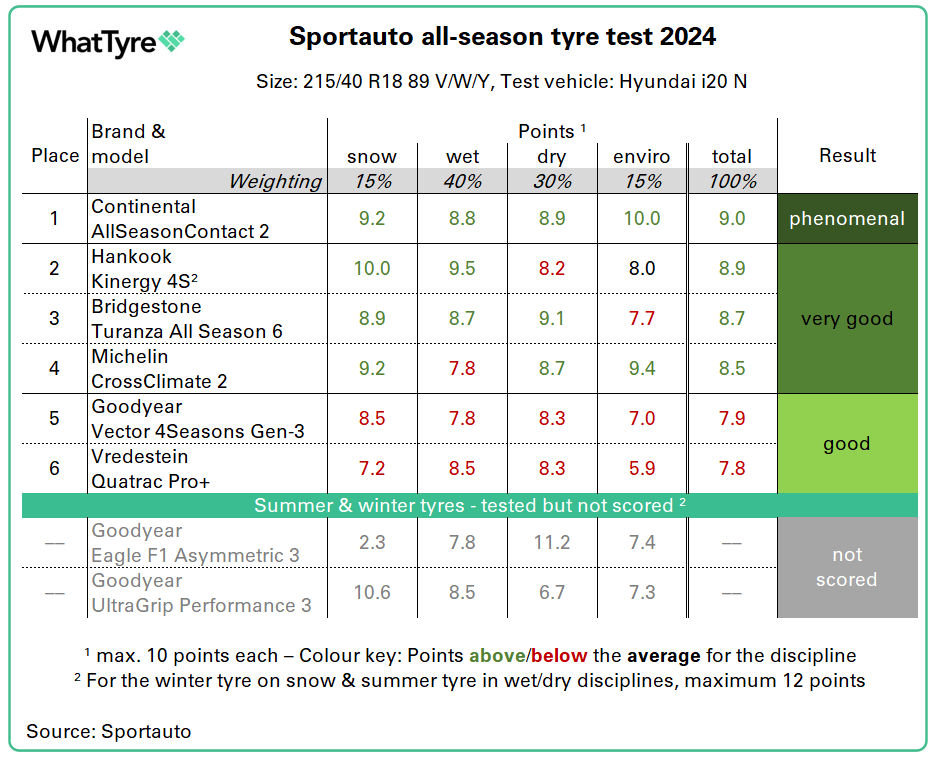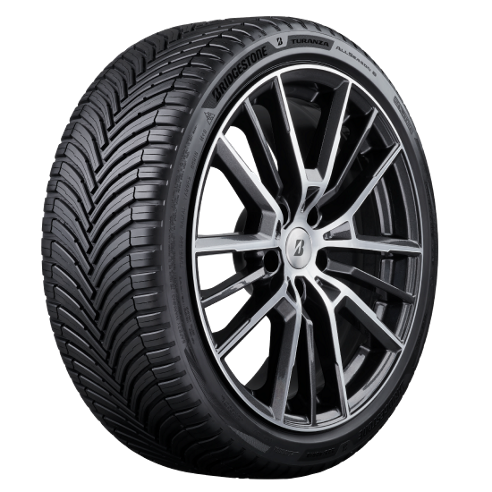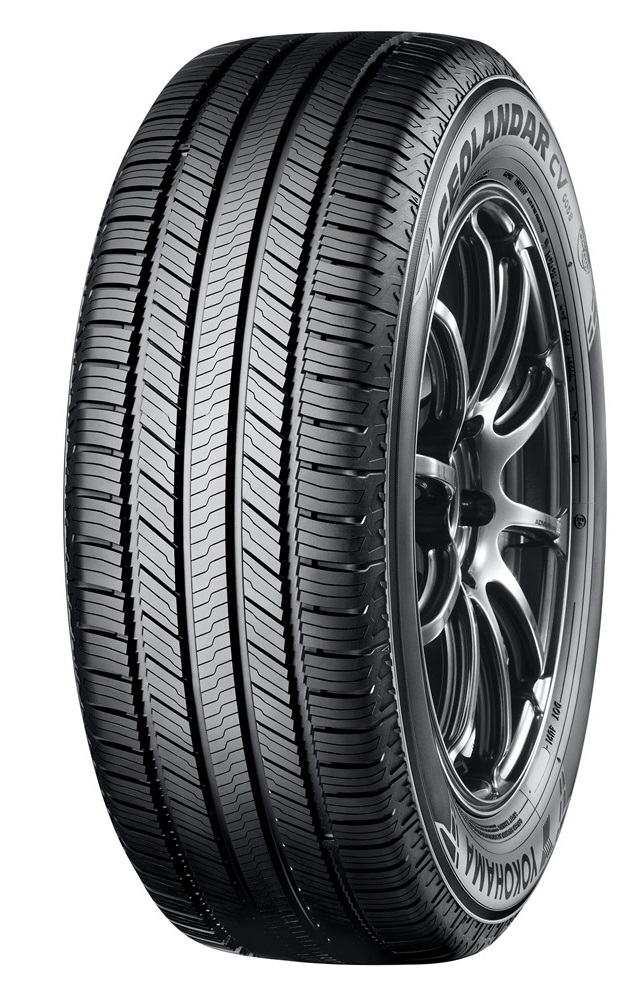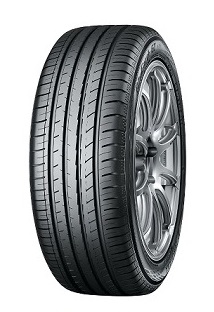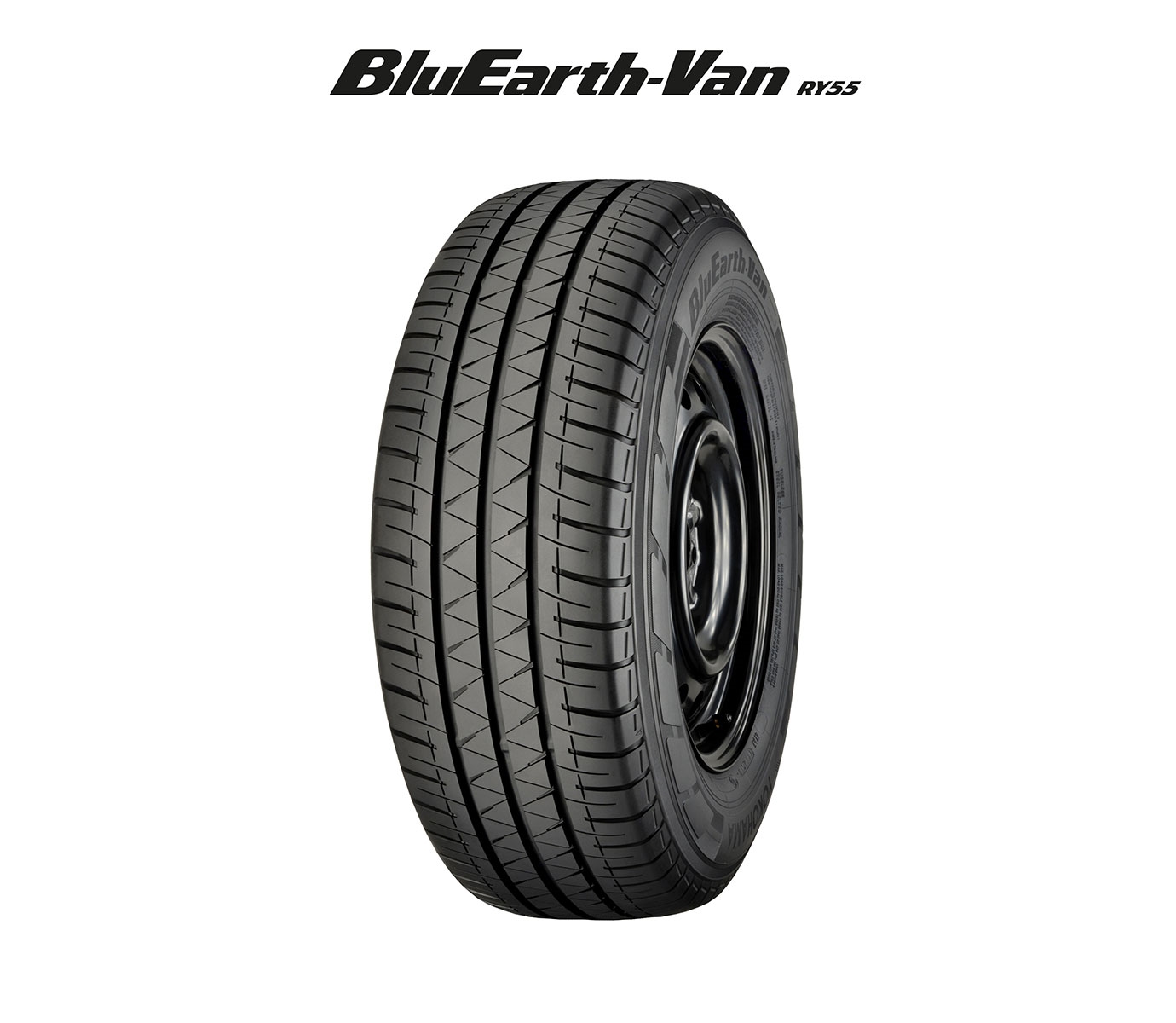Earlier this year, when Sportauto tested examined five brands of size 215/40 R18 summer tyres, it included an all-season product in its testing. This premium all-season tyre struggled against the summer tyres at temperatures well above the 20-degree mark, prompting the motoring magazine to conclude that “the all-season tyre is just a compromise” in summer conditions, especially when paired with sportsters such as the Hyundai i20 N it used for testing. Sportauto still holds this opinion, but it has now tested six all-season tyres – again in size 215/40 R18 – to see if the compromise label applied in cooler conditions.
Sportauto set out to determine whether an all-weather tyre could be a better choice for between the seasons, as well as to gauge the extent to which the performance levels of all-season tyres on snow deviate from those of a dedicated winter tyre. To assess this, the publication tested a summer and a winter tyre alongside the all-season products, evaluating how they faired in dry, wet and snowy conditions.
The all-season contenders in the Sportauto 2024 all-season tyre test are the Bridgestone Turanza All Season 6, Continental AllSeasonContact 2, Goodyear Vector 4Seasons Gen-3, Hankook Kinergy 4S2, Michelin CrossClimate 2 and Vredestein Quatrac Pro+. Goodyear is additionally represented by the Eagle F1 Asymmetric 3 summer and UltraGrip Performance 3 winter tyres. The publication again tested with a Hyundai i20 N.
Limbering up before snow testing
Prior to heading to Sweden to carry out testing in snowy conditions, Sportauto drove on all the tyres for 100 kilometres to wear off any release agent remaining from the vulcanisation process. It then evaluated each brand for its traction, braking, handling and lateral grip performance.
The summer tyre has a harder tread compound than its all-season and winter counterparts, and for this reason wasn’t very effective in sub-zero temperatures and on loose surfaces. The winter tyre, with its soft, cold-elastic rubber, took the lead here, subjectively and measurably achieving the best connection with the road. However, the all-season tyres weren’t far behind.
Indeed, it was an all-season tyre, the Hankook Kinergy 4S2 H750, that delivered the best lateral grip. The Hankook tyre was a particularly strong handler overall in the snow, starting and stopping well and remaining balanced and responsive during sudden evasive manoeuvres and load changes. Sportauto notes that the Hankook product was closer in handling performance to the winter tyre than to the worst performer amongst the all-season tyres.
Wet testing
Moving proceedings from Sweden to northern Germany, where the weather was below ten degrees, Sportauto tested the tyres’ performance on surfaces covered by around one millimetre of water. These are typical road conditions after heavy rain, conditions in which some tyres may offer less than optimal road grip.
Summer tyre tread compounds haven’t yet reached their optimal operating range at around seven degrees Celsius, and therefore the summer tyre took more than half a metre longer to stop than the worst all-season result. A similar picture emerges in the wet handling test, where the summer tyre reacts aggressively to load changes, suddenly oversteering with the unpowered rear axle just rolling along.
Amongst the all-season tyres, the Continental AllSeasonContact 2 and Hankook Kinergy 4S2 offer the best driving safety. The Michelin and Bridgestone tyres, on the other hand, suffer from limited grip on the front axle, resulting in pronounced understeer. The Goodyear Eagle F1 Asymmetric 3 summer tyre, however, excels in lateral grip (constant circular driving), thanks to the driven front axle heating up quickly, with the rear following obediently.
The summer tyre also performed well in the lateral aquaplaning test, its wide longitudinal grooves dispersing large quantities of liquid as the car drove over a 9mm layer of water. The Goodyear UltraGrip Performance 3 winter tyre evacuated water even more effectively, its deep and wide transverse channels that extend up to the shoulder proving ideal for draining water.
After taking victory in the snow, the Kinergy 4S2 also wins the wet testing, a discipline that contributes 40 per cent to the overall test score. Sportauto was not only impressed with the Hankook tyre’s measured values, but also gave its precise steering with good feedback the nod. In this regard it performed similarly to the Continental tyre, responding serenely when confronted by violent load changes, its limits only becoming apparent at very high speeds and transitioning smoothly from grip to sliding friction rather than with a sudden loss of adhesion.
More than 20mph at impact
There’s no need to fear a sudden loss of grip on dry asphalt, nevertheless, the Kinergy 4S2 lags behind its all-season competitors here, taking five metres longer to brake during an emergency stop from 100 km/h than the Michelin CrossClimate 2. This translates to a remaining speed of 34.4 km/h or 21.4 mph. Only the more deformable, particularly light winter tyre delivers a worse dry braking result.
Cold temperatures play but a minor role when it’s dry, and when braking and handling in these conditions, the summer tyre capitalises on its sizeable, stiff tread blocks and the largest contact patch with the asphalt. The Bridgestone Turanza All Season 6 and Michelin CrossClimate 2 also performed particularly well in dry conditions, compensating somewhat for lacklustre results in the wet.
Continental a nose ahead of Hankook
After heaping praise on the Hankook Kinergy 4S2 H750, Sportauto awarded overall victory in its 2024 all-season tyre test to the Continental AllSeasonContact 2. Explaining its decision, Sportauto says the Continental tyre not only combines good snow performance with high wet grip, dry road safety, and low rolling resistance, but also tops the environmental rating. Therefore, it narrowly beats the highly convincing Hankook tyre overall.
Back to the question of whether all-season tyres are a compromise. Sportauto stands by its original claim, but with an important proviso: “What may be just a compromise in summer proves to be a worthy winter tyre replacement. Especially in the cool and often wet transitional seasons, some of the slightly stiffer all-season tyres outperform the elastic winter profiles on asphalt and are grippy enough on snow. Plus, the all-season tyres tested here are also cheaper than their winter counterparts.”
How the tyres performed:
Test winner, rated phenomenal
Continental AllSeasonContact 2
+ Safe and dynamic on snow, very balanced and safe to drive on wet tarmac. Very low rolling resistance
– High speed possible in dry handling, but slightly limited lateral control on the rear axle
Rated very good
Hankook Kinergy 4S H750
+ Outstanding grip and safe dynamics on both snow-covered and wet roads
– Long braking distances and slight overall deficits on dry, cold tarmac
Bridgestone Turanza All Season 6
+ Secure cornering grip and balanced but somewhat nervous handling on snow. Very good braking performance on all surfaces
– Should steer more accurately in the wet and offer more cornering grip
Michelin CrossClimate 2
+ Strong grip, precise and dynamic on snow, quite balanced in the wet, strong deceleration in dry conditions. Particularly low rolling resistance
– Significantly delayed turn-in in the wet, sluggish in the dry
Rated good
Goodyear Vector 4Seasons Gen-3
+ Safe, easy to control, slightly understeering snow and wet handling
– Slightly longer braking distances in the wet, not particularly efficient, high rolling noise, increased rolling resistance
Vredestein Quatrac Pro+
+ Good braking and safe cornering grip on wet roads, high rolling comfort
– Reduced grip level and load change sensitivity on snow, delayed steering on wet and dry tarmac, very high rolling resistance
Summer tyre – not rated
Goodyear Eagle F1 Asymmetric 3
+ Typical summer tyre performance on wet and dry roads – despite cool temperatures. High steering precision and dynamics
– Unsuitable on winter roads, weak wet grip at low outside temperatures below +10 °C, offers less rolling damping
Winter tyre – not rated
Goodyear UltraGrip Performance 3
+ Typical winter tyre performance on snow, safe wet performance, superior aquaplaning resistance compared to summer or all-weather tyres
– Longer braking distances on wet and dry roads, less precise and direct handling, increased rolling resistance

